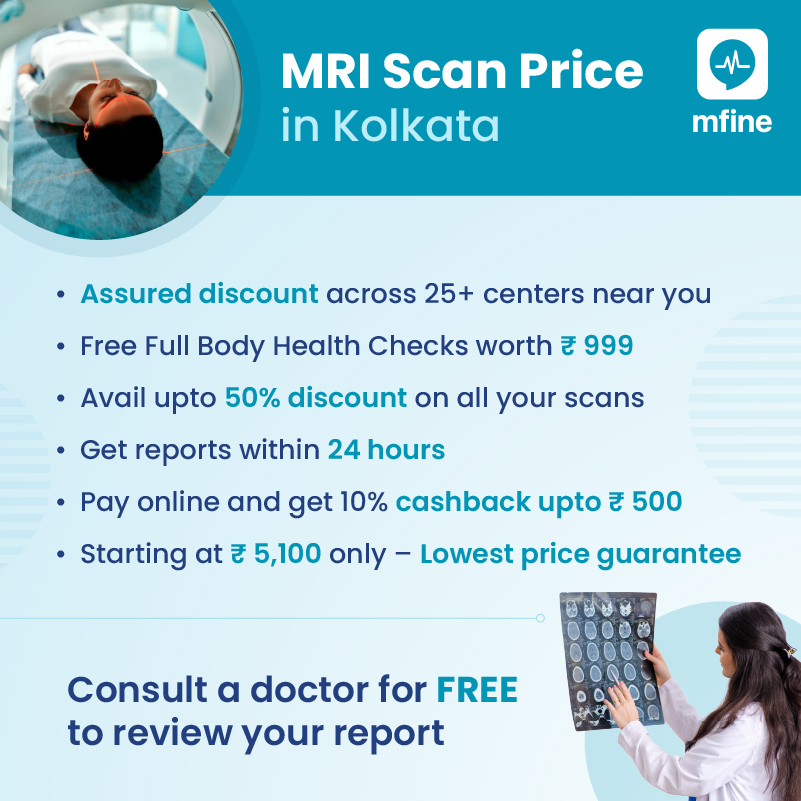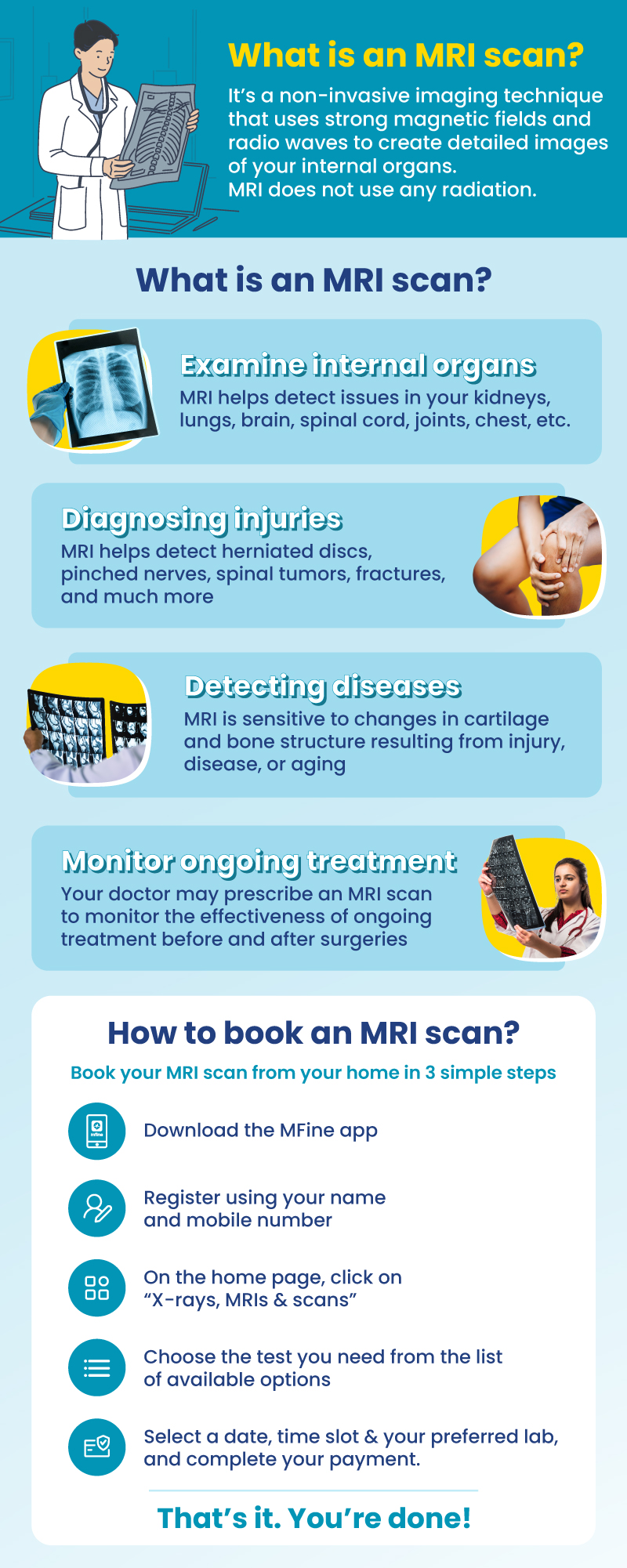
MRI Scan in Kolkata by MFine
|
Typically, an MRI scan in Kolkata costs over ₹8,000. However, through MFine, you can obtain one for just ₹ 5,100 only.
To avail of our exclusive offer, you can either call us at
☏08061970525
Or simply click on the button below, and we’ll give you a callback.
In addition, you will also be given a complimentary FREE online consultation with a doctor upon completion of your booking.
MRI scan costs in Kolkata
We have listed the most common MRI scans performed in Kolkata and their discounted rates below. It is important to note that these prices are subject to change, so please contact us for the most up-to-date information.
MRI Scan Cost in Kolkata |
Offer Price |
| Brain MRI Scan Cost in Kolkata | ₹5100 |
| Spine MRI Scan Cost in Kolkata | ₹5100 |
| Knee MRI Scan Cost in Kolkata | ₹5950 |
| MRI Chest Price in Kolkata | ₹5525 |
| Ankle MRI Scan Cost in Kolkata | ₹6800 |
| MRI Elbow Price in Kolkata | ₹6300 |
| MRI Shoulder Price in Kolkata | ₹5950 |
| MRI Whole Abdomen Price in Kolkata | ₹11050 |
| MRI Neck Price in Kolkata | ₹5525 |
| MRI KUB Price in Kolkata | ₹5525 |
| MRI Whole Spine Price in Kolkata | ₹12750 |
| MRI Leg Price in Kolkata | ₹5950 |
| MRI Hand Price in Kolkata | ₹5950 |
If you’re looking to book an MRI test in Kolkata and want to know the options available near your location, give us a call at 08061970525. We’ll help you find a lab that suits your needs and schedule a convenient appointment time.
Why should I book an MRI through MFine?
|
Exclusive Benefits with MFine
(1) Certified labs
Get access to over 600+ labs certified by NABL and NABH
(2) Same-day slot available
Get scans done on the same day
(3) Quick and convenient
Get reports in 12 hours and digital films in 15 – 20 minutes
(4) FREE Consultation
Post scans, consult a doctor for free to review your report
About MRI Scan
An MRI scan is a medical imaging technique that uses powerful magnets and radio waves to generate detailed images of your internal organs. Unlike X-rays or CT scans, it is a non-invasive procedure and does not involve ionizing radiation. This makes it a safer option for patients, particularly for repeat imaging.
MRI technology utilizes the hydrogen atoms present in your body to create detailed images of your organs. It’s important to keep in mind that many diseases are characterized by an increase in water content within the body. Because the human body consists primarily of water, which contains hydrogen atoms, changes in your water content can help MRI technology identify abnormalities in your organs.
MRI scans are frequently utilized for the diagnosis and monitoring of different medical conditions. These conditions can include neurological disorders, joint and soft tissue injuries, abdominal and pelvic abnormalities, tumors, and more.
Types of MRI scans
There are various MRI scans accessible, and each has a distinct purpose:
(1) Functional MRIs
Functional Magnetic Resonance Imaging or fMRI, is designed to study brain activity and function. It works by measuring changes in blood flow and oxygen levels in the brain, providing valuable insights into how the brain responds to different stimuli and tasks.
By analyzing these responses, scientists can better understand the brain’s neural networks and pinpoint the specific areas responsible for things like speech, memory, movement, and emotions.
fMRI is a non-invasive and safe technique that is commonly used in neuroscience research and can also assist doctors in planning brain surgeries.
(2) Magnetic Resonance Venography
Magnetic Resonance Venography (MRV) is a type of MRI that focuses on visualizing veins and blood flow within the body. This technique is often used to detect and evaluate conditions like deep vein thrombosis (DVT), venous insufficiency, and vascular malformations.
To enhance the clarity of blood vessel images during the MRV procedure, a contrast agent may be administered intravenously. The highly detailed images obtained from MRV help with diagnosing venous disorders and determining appropriate treatment options.
(3) Breast Scans
Breast Magnetic Resonance Imaging, or Breast MRI for short, is an additional imaging method used to assist in detecting and evaluating breast cancer. This technique is especially helpful in assessing breast abnormalities, identifying breast cancer in high-risk individuals, and determining the spread of cancer in patients who have already been diagnosed with breast cancer.
Breast MRI provides a detailed view of breast tissue, which is especially useful when mammography or ultrasound results are unclear. Nevertheless, it is not a recommended screening method for all women and is usually reserved for specific cases.
(4) Cardiac MRI
Cardiac MRI is a type of MRI scan that focuses on examining the heart and cardiovascular system. It produces highly detailed images of the heart’s structures, including its chambers, valves, and blood vessels. This allows for a thorough assessment of heart function and identification of any potential abnormalities.
Cardiac MRI is commonly used to diagnose a range of heart conditions, such as coronary artery disease, myocardial infarction (heart attack), cardiomyopathies, and congenital heart defects. It is also essential in evaluating cardiac function both before and after cardiac surgeries or interventions.
(5) Magnetic Resonance Angiography (MRA)
Magnetic Resonance Angiography (MRA) is a specialized MRI technique that allows doctors to view blood vessels and the flow of blood within the body. MRA produces highly detailed images of arteries and veins without requiring any invasive procedures, such as catheter angiography.
Doctors commonly use MRA to investigate blood vessel abnormalities, identify vascular malformations, and evaluate the blood supply to different organs. MRA is particularly useful in diagnosing conditions like aneurysms, arterial stenosis (narrowing), and vascular tumors.
Each type of MRI scan has its own unique advantages and plays a critical role in the diagnosis and treatment planning process for various medical conditions.
Prerequisites for MRI
Patients should know the following prerequisites before getting an MRI scan to ensure a smooth and accurate procedure:
Medical History and Allergies: Inform the medical staff about any allergies, previous surgeries, or health conditions you may have. Certain conditions or metallic implants may require additional precautions or alternative imaging methods.
Metallic Objects: To ensure the safety and accuracy of the scan, it is important for patients to remove all metallic items, such as jewelry, piercings, and hairpins, before undergoing an MRI scan. This is because the powerful magnets used in MRI scanners can interact with metallic objects in the body, which may lead to distorted images and pose safety risks.
Fasting Instructions: For certain abdominal MRI scans, fasting beforehand may be necessary. This is because food in the digestive system can cause interference, and fasting helps to improve the clarity of the resulting images.
Claustrophobia Concerns: If you are scheduled for an MRI scan, it’s important to note that some machines are enclosed, which may cause feelings of claustrophobia. If you are concerned about being in a tight space, it’s recommended that you speak with your medical team before the scan.
They may provide techniques or mild sedation to help you feel more comfortable during the procedure. Following these guidelines will help ensure the accuracy and safety of your MRI scan, leading to better diagnostic outcomes and subsequent medical management.
FAQs (Frequently Asked Questions)
What is the cost of a chest MRI scan in Kolkata?
You can get a chest MRI done in Kolkata starting at Rs. 5525 only.
Is MRI safe for the chest?
Yes, having an MRI of the chest is completely safe. Unlike CT scans or X-rays, MRIs do not produce ionizing radiation. Nevertheless, it is always advisable to consult with your doctor before undergoing any MRI scans.
Why MRI scan is expensive in India?
The high cost of maintaining MRI machines is a major contributing factor. But, at MFine, we offer the lowest price guarantee in the market. Take a look at our prices listed above.
What are the side effects of an MRI scan?
MRI scans are generally safe and do not typically result in side effects. However, certain factors such as the use of contrast medium, existing health conditions, sensitivity to medications, or pregnancy may increase the likelihood of side effects. For more information on the safety of MRI scans, please refer to this article on MRI scan side effects.
Is MRI safer than CT scan?
Both MRI and CT scans are considered safe for use. The choice of which to use depends on your medical condition and your doctor’s recommendation. However, MRIs do not produce ionizing radiation, unlike CT scans.
Other Topics You May Be Interested In:

 Call us:
Call us:



 Call
Now
Call
Now